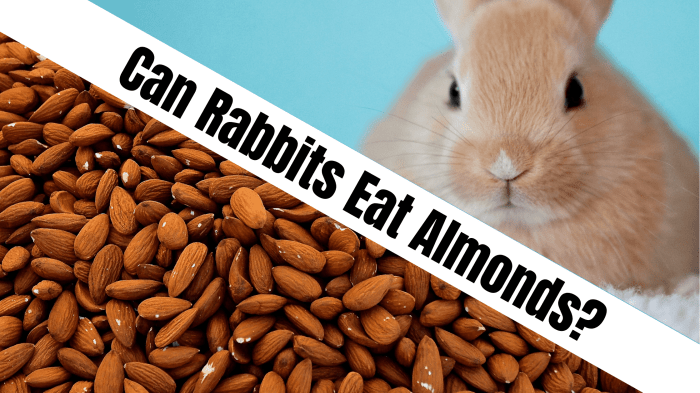Almonds are a popular snack for humans, but can rabbits enjoy this nutty treat as well? In this article, we will explore the nutritional benefits and potential risks of feeding almonds to rabbits. We will also provide safe consumption guidelines and suggest alternative healthy treats that offer similar nutritional value without the risks.
Rabbits are herbivores with a unique digestive system that requires a specific diet to stay healthy. Understanding the nutritional composition of almonds and their impact on rabbit health is crucial for responsible pet ownership.
Potential Risks of Almonds for Rabbits

Almonds, while a nutritious snack for humans, can pose certain health risks to rabbits. It’s important to understand these risks and limit almond consumption accordingly to ensure the well-being of your rabbit companion.
Digestive Issues
Rabbits have a sensitive digestive system that is not well-suited to process large amounts of fat. Almonds are relatively high in fat content, and excessive consumption can lead to digestive upset, diarrhea, and even pancreatitis.
Excessive Fat Intake
Rabbits are prone to obesity and related health problems, such as heart disease and liver disease. Almonds are a high-calorie food, and excessive intake can contribute to weight gain and the associated health risks.
Allergic Reactions or Sensitivities
Some rabbits may be allergic to almonds or have sensitivities that can trigger adverse reactions. Symptoms of an allergic reaction can include skin irritation, respiratory problems, and digestive upset. If you suspect your rabbit is allergic to almonds, discontinue feeding them immediately and consult with a veterinarian.
Safe Consumption Guidelines for Almonds
To ensure the safety and well-being of rabbits when consuming almonds, it is crucial to adhere to specific guidelines regarding the amount and frequency of intake.
Gradual Introduction
When introducing almonds into a rabbit’s diet, it is essential to start gradually to allow the rabbit’s digestive system to adapt. Begin by offering a small piece of almond (approximately the size of a pea) once a week. Monitor the rabbit closely for any signs of digestive upset, such as diarrhea or bloating.
If no adverse effects are observed, you can gradually increase the frequency and quantity of almonds offered over time.
Appropriate Consumption
As a general guideline, adult rabbits can safely consume up to two small almonds per week. This amount provides a healthy dose of essential nutrients without overwhelming their digestive system.
Monitoring and Veterinary Attention
After your rabbit consumes almonds, observe them for any unusual symptoms. If you notice any signs of digestive distress, such as vomiting, diarrhea, or lethargy, discontinue almond consumption and contact your veterinarian promptly.
Alternative Healthy Treats for Rabbits
Almonds, while nutritious, should be given to rabbits sparingly due to their high fat content. However, there are several alternative treats that provide similar nutritional benefits without the potential risks.
The table below compares the nutritional value of almonds to other healthy treats for rabbits:
| Treat | Calories (per 100g) | Fat (g) | Protein (g) | Fiber (g) |
|---|---|---|---|---|
| Almonds | 579 | 49.9 | 21.15 | 12.5 |
| Bananas | 93 | 0.3 | 1.1 | 2.6 |
| Carrots | 41 | 0.2 | 0.9 | 2.8 |
| Celery | 16 | 0.2 | 0.7 | 1.6 |
| Strawberries | 32 | 0.3 | 0.7 | 2.0 |
As you can see, bananas, carrots, celery, and strawberries are all lower in calories and fat than almonds, and they also provide essential vitamins and minerals. These treats should be given to rabbits in moderation, as too much sugar or fiber can cause digestive problems.
Frequency and Amount of Alternative Treats
The frequency and amount of alternative treats that are safe for rabbits will vary depending on the size and age of the rabbit. However, a general rule of thumb is to give no more than 1-2 tablespoons of treats per day.
Treats should also be given in addition to a rabbit’s regular diet of hay, pellets, and fresh vegetables.
Last Point
In conclusion, while almonds can provide some nutritional benefits to rabbits, they should be fed in moderation and under close supervision. The potential risks associated with almond consumption outweigh the benefits, making it a less desirable treat option for rabbits.
Pet owners should opt for alternative healthy treats that are specifically designed to meet the nutritional needs of these delicate animals.
FAQ
Can rabbits eat raw almonds?
No, raw almonds contain a toxin called amygdalin, which can be harmful to rabbits.
Can rabbits eat roasted almonds?
Yes, roasted almonds are safe for rabbits to eat in moderation.
How often can rabbits eat almonds?
Rabbits should only eat almonds once or twice a week, and only a small handful at a time.
What are some alternative healthy treats for rabbits?
Good alternative treats for rabbits include fresh fruits and vegetables, such as carrots, apples, and bananas. You can also give your rabbit small amounts of plain yogurt or oatmeal.